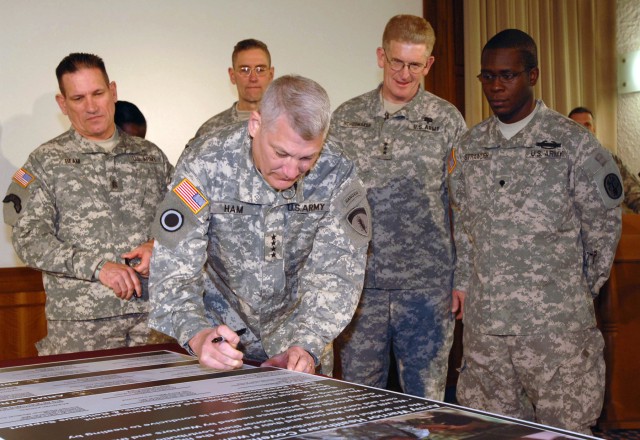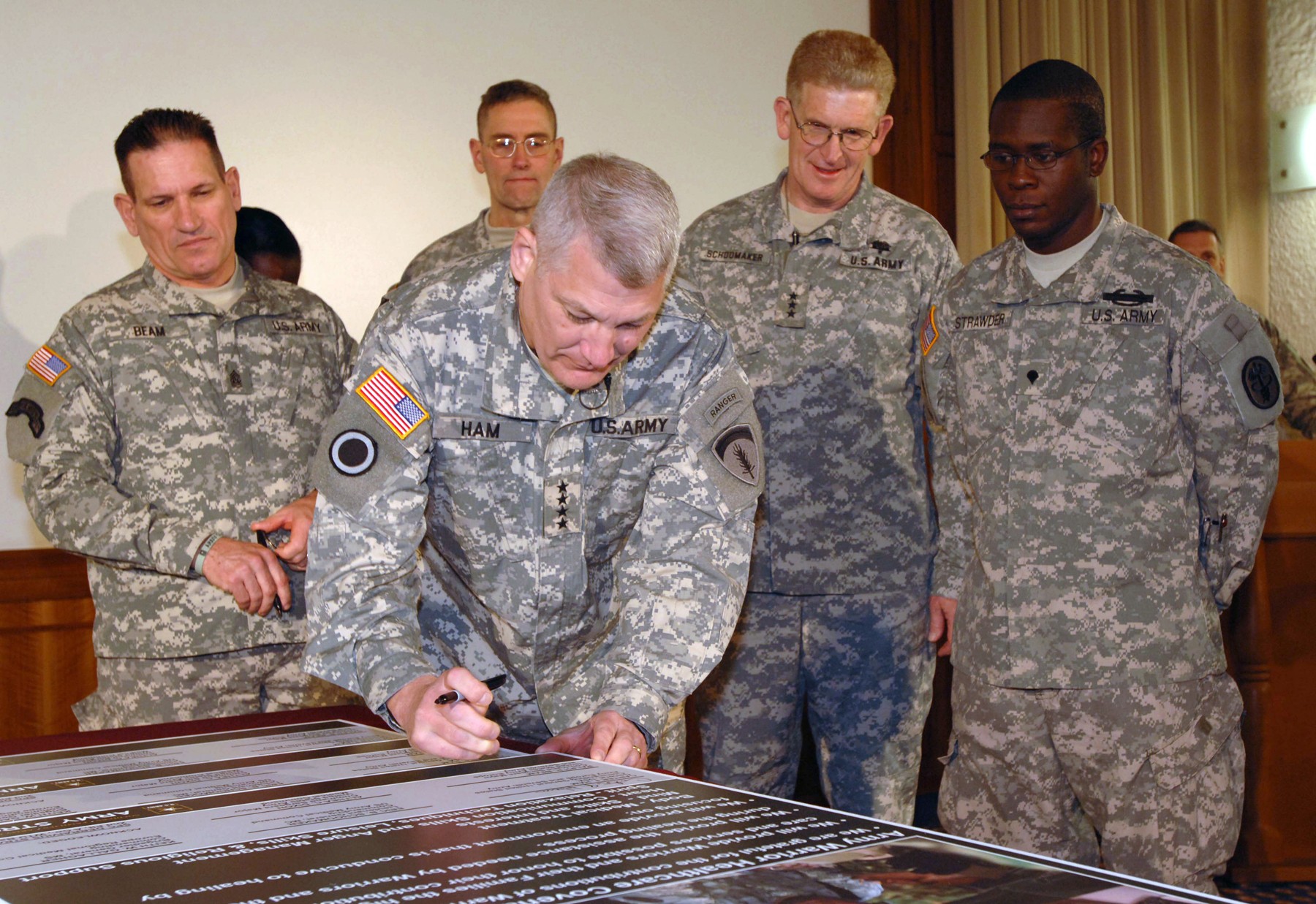
HEIDELBERG, Germany - An infantryman shot twice in the legs while serving in Iraq acknowledged a covenant signed today by Army leaders who pledged to care for him and other Wounded Warriors.
Standing without crutches he has used for most of the past five months, Spc. Derraivius Strawder leaned over and signed the Army Warrior Healthcare Covenant during a ceremony at U.S. Army Europe headquarters in Heidelberg, Germany. His signature was near those of Gen. Carter F. Ham, USAREUR commanding general, and Lt. Gen. Eric B. Schoomaker, the Army Surgeon General.
As Gen. Ham talked to Warriors, Families and key USAREUR staffmembers about the significance of the Warrior Healthcare Covenant, he looked directly at Strawder and said, "... this is about you and the Soldiers of the Warrior Transition Units all across Europe. This ceremony symbolizes the commitment of the United States Army Europe represented by me and Command Sgt. Maj. Beam and by the medical community."
"It is a very serious commitment and I take it very personally," said Gen. Ham, who said his son-in-law is in a Warrior Transition Unit in the U.S. "This is the fulfillment of the commitment that we make to every Soldier and their families when they raise their right hand and join the Army."
Lt. Gen. Schoomaker said the covenant is a long-term commitment by the Army Medical Command and the entire Department of Defense.
"Our signatures, our hearts and our minds are behind this pledge to you," said Schoomaker. "We will be here for you for as long as it's going to take to get you healthy in body, mind, and spirit."
Schoomaker said the Army Medical Command now has 2,400 Warrior Transition Unit cadre members to help about 13,000 Warriors overcome major injuries, illnesses or physical or psychological combat wounds as they transition to another role in the Army or to civilian life.
In Europe, there are about 370 Warriors in Transition in four WTUs. A WT battalion in Heidelberg supervises those units located in the Landstuhl area, Vicenza and two in Bavaria.
Strawder, who has had two combat tours in Iraq, calls those WTUs "a good step forward."
"It's helped me a lot because I don't have to worry about anything other than getting healthy," he said. "I really think from my first tour to now there has been a drastic change in the way the Army treats veterans coming back (from the war), not just wounded veterans, but veterans in general. Every step they take is a sincere one. They want us to succeed."
Strawder was part of a Command Security Detachment protecting battalion commanders June 23 in Salaman Pak, Iraq, when his group came under fire as they move to their vehicles following a neighborhood advisory meeting. Several were killed and some, including Strawder, were wounded.
Then with Headquarters and Headquarters Company, 2nd Battalion, 6th Infantry Regiment, Strawder, 29, was evacuated along with the others to Landstuhl Regional Medical Center, where he was an inpatient until July 24. He was then assigned to 2nd Platoon, Company A, Warrior Transition Unit, in Baumholder, Germany, where he continues to recover.
Spc. Kendall L. Schultz, his wife Amy and son Kendall, 14, were among six Warrior Transition families and 15 WTU cadre who attended the ceremony. Schultz, who ruptured two disks in his back during a physical fitness test in January and has not fully recovered, said the Mannheim WTU is easing his family's transition back to civilian life. Though still pending Medical Evaluation Board results, he does not expect to stay in the Army as a truck driver.
His wife, Amy, said the WTU cadre is easing their anxiety about the possibility of returning to civilian life.
"They always answer our questions and provide information about education and opportunities," she said.
Schultz said he believes the leaders who signed the Warrior Healthcare Covenant in Heidelberg are sincere.
"I hope that sincerity and commitment goes all the way to the company level," he said.
Brig. Gen. Keith W. Gallagher, USAREUR Command Surgeon and commander of the Europe Regional Medical Command, USAREUR Command Sgt. Maj. Ralph R. Beam, and Command Sgt. Maj. Althea C. Dixon of the U.S. Army Medical Command also signed the covenant.
The Army Warrior Healthcare Covenant
Aca,!Ac We are grateful for the contributions of Warriors and their Families
Aca,!Ac We will provide Warriors and their Families the highest quality of care and services possible to honor their contributions to our Nation.
Aca,!Ac We will provide the assistance needed by Warriors and their Families during the healing process.
Aca,!Ac We will provide initiatives and program for Warriors and their Families that support their transition back to duty or their continued service to our nation as a veteran.
Aca,!Ac We will provide an environment that is conducive to healing by focusing on:
o Body - Medical treatment
o Mind - Skills and interests
o Heart - Communication skills and anger management
o Spirit - Relaxation techniques, leisure skills and religious support

Social Sharing